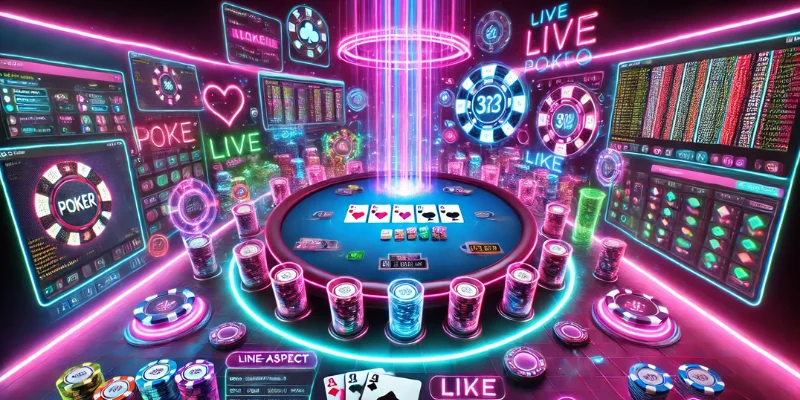Direct Employment in Casinos Dealers, Floor Staff, and Management
Live poker in the Philippines has become a major attraction, drawing players from across the country and around the world. As an experienced casino player who’s spent years observing the inner workings of the industry, I’ve seen firsthand how live poker events create jobs and shape the casino workforce. Dealers, floor staff, and management play critical roles in ensuring the smooth operation of poker rooms, and their presence is a key component of the larger economic impact of live poker in the country.
In this article, I’ll explore the various roles that poker-related employment in casinos offers and highlight how this job creation benefits both individuals and the local economy. Whether it’s a dealer managing the hands at the table or a floor manager ensuring everything runs efficiently, the employment generated by live poker is substantial. Let’s dive deeper into the roles and responsibilities that fuel this vibrant industry.
The Heart of Live Poker Events
At the heart of any live poker event are the poker dealers. Dealers are responsible for maintaining the flow of the game, distributing cards, and ensuring that all poker rules are followed. They are essential for creating an enjoyable and fair gaming experience.
- Skill Development: Dealers need to be highly trained. In addition to knowing the rules of multiple poker variants (like Texas Hold’em and Omaha), they must handle chips quickly and accurately, ensure fairness, and manage large sums of money.
- Consistency and Fairness: Dealers are the face of the game at the table. Their ability to enforce the rules consistently builds trust with the players, which is crucial for the integrity of any casino.
- Creating Job Opportunities: Given the growing popularity of poker, casinos in the live poker games Philippines regularly hire dealers, offering an entry point into the gaming industry. It’s an in-demand position that requires skill but also offers opportunities for upward mobility.
In my years as a player, I’ve interacted with countless dealers. The good ones make the game run smoothly, and the great ones can elevate the entire experience with their personality and professionalism. Many casinos now run dealer training programs, helping to develop a skilled workforce and providing jobs for thousands.
The Unsung Heroes Behind the Scenes
While dealers are often in the spotlight, floor staff are the backbone of any successful poker room. Their responsibilities include everything from overseeing the integrity of games to handling disputes and managing the overall flow of the room.
- Game Integrity: Floor staff constantly monitor the tables to ensure there is no collusion or rule-breaking. Their presence deters cheating and keeps the games running fairly.
- Conflict Resolution: Players can be intense, especially in high-stakes games. Disagreements over the rules or dealer decisions are inevitable. It’s the job of floor staff to step in and resolve disputes in a fair and impartial manner.
- Maintaining the Poker Room Environment: From arranging seats to managing waitlists, floor staff keep the poker room organized. They coordinate the movement of players between games and ensure that no one is waiting too long to join a table.
Floor staff positions provide stable employment opportunities, especially during major poker events or festivals when poker rooms are at full capacity. Casinos often offer competitive salaries for floor personnel, and experienced staff members can move into higher management positions.
Poker Room Supervisors: Ensuring Efficient Operations
Supervisors oversee poker rooms and ensure everything runs smoothly. They manage the entire poker staff, resolve complex disputes, and ensure compliance with casino regulations.
- Staff Management: Supervisors are responsible for coordinating the dealer and floor staff schedules, making sure there is adequate coverage during peak hours, and providing support where needed.
- Handling Larger Disputes: When floor staff cannot resolve a situation, the poker room supervisor steps in. They have the authority to make final rulings and must be knowledgeable about both casino regulations and poker rules.
- Player Relations: Many supervisors build rapport with regular players. By creating a welcoming environment, they help the casino retain customers and encourage repeat visits. They also handle complaints and ensure player satisfaction.
Supervisors play a crucial role in maintaining the reputation of a poker room. With their oversight, games remain efficient and enjoyable, contributing to the casino’s success. This creates high-level employment opportunities for individuals who have advanced through the ranks of dealers and floor staff.
Casino Management: The Strategic Force Behind the Operation
Casino managers don’t just manage the poker room—they oversee the entire gaming floor. Their responsibilities are broader and more strategic, involving everything from financial oversight to customer experience and staff management.
- Financial Oversight: Managers are responsible for ensuring that poker and other games are profitable. They must monitor revenue from poker tournaments and cash games, balancing it with operational costs such as staffing, equipment, and player incentives.
- Strategic Planning: High-level decisions about which poker events to host, how to promote them, and which services to offer are made at the management level. By bringing in major poker tournaments, casinos can attract international players, boosting tourism and increasing overall revenue.
- Human Resource Management: Casino managers work closely with HR to hire staff, provide training, and manage team dynamics. With a growing number of poker players visiting casinos in the Philippines, they need to ensure that staffing levels meet the demand.
- Compliance and Regulation: Managers must also ensure that the casino operates within the legal framework set by the Philippine Amusement and Gaming Corporation (PAGCOR). Staying compliant with gaming laws is vital for maintaining the casino’s reputation and operating license.
 How Live poker Jobs Impact Local Communities
How Live poker Jobs Impact Local Communities
Live poker not only creates jobs within the casino but also boosts employment in surrounding communities. The jobs created by poker rooms extend to those who may never set foot inside a casino, offering a significant ripple effect.
- Local Businesses: Casinos need various goods and services, from food and beverages to cleaning and maintenance. These contracts often go to local vendors, stimulating small business growth in the area.
- Supporting Roles: Beyond direct casino employment, supporting roles such as valet services, janitorial staff, and maintenance workers also see an uptick in demand during live poker events.
- Increased Consumer Spending: The wages earned by casino staff are spent locally, boosting the economic activity in surrounding neighborhoods. This strengthens the local economy by increasing demand for goods and services.
Training and Career Advancement Opportunities for Poker Staff
One of the great things about working in a casino is the potential for career advancement. Many employees start as entry-level dealers or floor staff and work their way up to supervisory or managerial positions.
- Dealer Training Programs: Casinos often invest in dealer training programs to help staff develop the skills they need to succeed. For many Filipinos, these programs offer a valuable entry point into a stable and well-paying career.
- Continuous Skill Development: Casinos encourage staff to continue learning, offering further training in game variants, dealing techniques, and customer service. This opens doors to promotions and higher-level responsibilities.
- Career Mobility: With experience, many employees move into floor supervision or even poker room management. The demand for skilled personnel in this sector ensures that ambitious employees have opportunities to grow and climb the career ladder.
In this way, live poker events not only provide jobs but also support long-term career development for Filipinos. The growing gaming industry means that skilled workers can have a prosperous future, which contributes to the overall economic impact of live poker.
How Job Creation Transforms the Local Economy
The employment generated by live poker doesn’t stop at the casino floor. The broader economic impact is clear when you consider how these jobs influence the larger community and local industries.
- Stable Employment Opportunities: Poker dealers, floor staff, and casino management positions offer stable employment in an industry that continues to grow. For many Filipinos, these jobs provide a steady income and job security.
- Boosting Local Economy: Salaries earned in the casino workforce contribute to local consumer spending, which supports businesses such as restaurants, retail shops, and entertainment venues.
- Increased Government Revenue: By creating jobs and attracting tourists, live poker events generate significant tax revenue for the government. This revenue can be reinvested into infrastructure, education, and other public services, benefiting the wider population.
Hospitality Industry Boost: Hotels, Restaurants, and Event Spaces
As a seasoned casino player in the Philippines, I’ve witnessed firsthand the incredible influence that live poker tournaments have on the hospitality industry. From major hotel chains to small local restaurants, the ripple effects of these events are undeniable. Live poker tournaments bring in international and local players who fuel a dynamic ecosystem that supports hotels, restaurants, event spaces, and the people who work in these sectors. The impact on job creation and economic growth is substantial and often overlooked when people discuss the economic impact of live poker.
Hotels: Accommodating Poker Tourists
Live poker tournaments, especially large-scale ones, bring in an influx of players and visitors from all around the world. These visitors need accommodation, making hotels a critical part of the poker ecosystem.
Job Creation in Hotels
Poker tournaments create a surge in demand for hotel rooms, especially in cities like Manila and Cebu, where poker events are frequent. This demand leads to increased employment opportunities in various hotel roles:
- Front Desk and Concierge Staff: Hotels need more front desk employees to handle the increased flow of guests. The concierge service is also in high demand as poker players often require help booking transport, dining reservations, or local attractions.
- Housekeeping: With hundreds of players staying for multiple days, hotels need to expand their housekeeping staff to maintain rooms and public spaces.
- Food and Beverage Services: Many hotels also need to ramp up their in-house restaurant and bar services, creating more jobs for servers, bartenders, and kitchen staff.
In my experience as a player, the quality of hotel service can make or break the experience of a poker event. A well-managed hotel not only ensures comfort but also fosters loyalty among players who may return for future tournaments.
Restaurants: Catering to Players and Visitors
Beyond the casino walls, poker players often explore local dining options, contributing significantly to the restaurant industry. Players typically need to refuel between long hours at the poker table, and this creates a steady stream of customers for nearby eateries.
Impact on Restaurant Employment
The economic impact of live poker extends beyond the casino, generating jobs in various parts of the restaurant business:
- Waitstaff and Kitchen Personnel: The surge in customers during poker tournaments requires additional staff to maintain service quality. Waiters, cooks, and dishwashers are often hired on a temporary or full-time basis, depending on the restaurant’s needs.
- Management and Supervisory Roles: Restaurants that see an influx of poker players often require additional supervisory staff to handle the increased volume and ensure smooth operations.
- Baristas and Bartenders: Coffee shops and bars within proximity to casinos benefit greatly from poker traffic, hiring additional staff to keep up with the demand for beverages and light snacks between rounds.
One interesting trend I’ve noticed over the years is that poker players have distinct preferences when it comes to dining. They often seek out quick, high-quality meals that won’t interfere with their tournament schedule. This has given rise to niche dining experiences around major poker venues, from premium steak houses to casual, 24-hour cafes catering to the poker crowd.
Event Spaces: Hosting Large Poker Tournaments
The most significant tournaments often require large venues to accommodate hundreds of players, spectators, and media. Event spaces in hotels and casinos are prime locations, but other venues, such as convention centers or multi-use spaces, are also key players in the poker scene.
Creating Jobs in Event Management
Live poker events don’t just happen by chance—they require extensive planning and coordination, which leads to job creation in event management:
- Event Coordinators: These professionals are responsible for organizing the logistics of poker tournaments, including seating arrangements, equipment setup, and coordination with the casino and hospitality staff.
- Security Personnel: Large poker tournaments require increased security to ensure player safety, handle crowds, and maintain the integrity of the event. Security guards, surveillance teams, and even plainclothes officers are hired for these events.
- IT and Audio-Visual Support: Poker tournaments often require live streaming, digital displays, and media coverage, especially for international events. This creates demand for IT specialists and AV technicians to handle these technical needs.
- Catering and Event Services: Poker events usually include side services such as catering for VIP guests or media personnel. Catering companies and in-house event staff see a surge in employment during these tournaments.
As a player, I can attest to the importance of a well-organized event. The smooth running of a tournament enhances the experience for both the players and the audience, and it’s these behind-the-scenes workers that make it all happen.
 Live Poker Transportation and Tours: A Side Benefit for the Hospitality Sector
Live Poker Transportation and Tours: A Side Benefit for the Hospitality Sector
The influx of poker players doesn’t just stop at hotels and restaurants—it also extends to transportation and tourism services. Many players, especially those traveling from abroad, want to explore the local area during their downtime.
Supporting the Transport Sector
Players need reliable transportation to and from the casino, hotels, and dining spots, creating additional opportunities for transport companies:
- Taxi Services: Local taxi and ride-hailing services see a surge in demand, especially around poker venues. Many drivers are hired on a contract basis to support the extra traffic.
- Private Car and Shuttle Services: Some casinos and hotels offer private shuttles to transport players between their accommodations and the event. This increases demand for drivers and fleet managers.
- Tour Guides and Local Tours: International players often extend their stay beyond the poker tournament, exploring famous Philippine attractions. This has led to a niche market for local tours, where guides and travel agencies benefit from poker-related tourism.
The combination of gaming and tourism provides a much-needed boost to the local economy. In particular, players who are eliminated early in the tournament often take advantage of their free time to explore nearby islands or tourist spots, contributing further to the economic impact of live poker.
Hotel Chains in Supporting Large-Scale Poker Events
While smaller hotels benefit from poker events, major hotel chains are often partners in hosting international tournaments. These large establishments provide the infrastructure needed for high-stakes games, attracting players who prefer luxury accommodations.
Job Creation in Luxury Hotels
For high-profile poker events, luxury hotels cater to a more affluent clientele, creating different employment opportunities:
- VIP Services: High-rollers expect top-notch service, and casinos deliver by hiring specialized staff for VIP suites, personal butlers, and concierge services.
- Event Planners for Exclusive Events: Large hotels often host private side events for sponsors or high-profile players. These require dedicated event planners who specialize in high-end service delivery.
- Spa and Wellness Services: After a long day at the poker table, many players seek relaxation. Spas within luxury hotels see an uptick in demand for massage therapists, wellness experts, and attendants during tournaments.
These luxury hotel chains are critical partners in attracting international players. As someone who’s played in various poker venues across the Philippines, I can say that the quality of accommodation often determines a player’s willingness to return for future tournaments.
Economic Impact of Live Poker on Local Food Vendors and Pop-Up Markets
Poker events don’t just boost established hotels and restaurants—they also benefit local food vendors and pop-up markets, especially in areas near the casino. Many smaller establishments set up temporary stalls during major tournaments to cater to the large crowds.
Job Creation for Local Entrepreneurs
- Food Stalls and Mobile Kitchens: Pop-up food vendors thrive in areas surrounding poker events, hiring extra staff to manage the rush of poker players and tourists looking for quick meals between games.
- Temporary Staff for Markets: Local markets often see an influx of customers during poker tournaments. Vendors hire temporary staff to help with the increased demand for products, including souvenirs, snacks, and beverages.
- Delivery and Takeout Services: Players who prefer to eat in their hotel rooms or at the poker table rely on local delivery services, boosting employment for couriers and food delivery platforms.
These local vendors benefit greatly from the surge in tourism, and poker players appreciate having more food options beyond traditional restaurants. I’ve seen firsthand how these businesses thrive during tournament season, adding to the overall economic impact of live poker.
Extended Stays: Encouraging Poker Tourists to Stay Longer
Many international players don’t just come for the tournament—they stay to experience everything the Philippines has to offer. This creates an extended revenue stream for the hospitality industry.
Tourism Packages for Poker Players
- Hotel-Tournament Packages: Some hotels offer extended stay packages that include both accommodations and entry into smaller side events or local attractions.
- Casino and Resort Combos: Resorts near poker venues often attract players who prefer to combine their tournament experience with a vacation. These resorts create employment opportunities for local hospitality staff and guides.
Encouraging players to extend their stay generates additional revenue for the hospitality sector, from hotel bookings to dining and tours. This long-term tourism strategy plays a significant role in the overall economic impact of live poker.
Training and Skill Development in Hospitality Services
Live poker tournaments don’t just create jobs—they also enhance the skills of workers in the hospitality sector. Casinos and hotels often invest in training programs to ensure their staff can meet the unique demands of poker tourists.
Opportunities for Upskilling
- Language Training: With many international visitors, hotel and restaurant staff are often trained in multiple languages to enhance guest experiences.
- Customer Service Excellence: Poker players, especially those in VIP services, expect top-tier service. Training in customer service, problem-solving, and hospitality etiquette becomes essential.
- Event Management Training: Event spaces and hotel staff receive additional training on handling large crowds, managing event logistics, and coordinating with casino staff.
These training opportunities not only improve service quality but also provide long-term benefits for employees, offering them skills they can use throughout their careers in the hospitality industry.
 Taxation of Casino Revenues from Live Poker Tournaments
Taxation of Casino Revenues from Live Poker Tournaments
As a long-time poker player in the Philippines, I’ve seen firsthand how live poker tournaments benefit more than just the players and casino operators. The government plays a pivotal role in the regulation and taxation of these events, ensuring that poker doesn’t just fuel the gambling industry but also serves as an economic catalyst for the country. From permits to licensing fees and taxes, live poker events contribute significantly to government revenue, which, in turn, helps stimulate local economic development.
The most direct way that poker events contribute to government coffers is through the taxation of casino revenues. Live poker tournaments can attract thousands of players, both local and international, which translates to substantial income for casinos. This income is then subject to taxation, providing a reliable revenue stream for the government.
Casino Taxation on Poker Earnings
- Gross Gaming Revenue (GGR): Casinos in the Philippines are required to pay taxes on their gross gaming revenue (GGR), which includes the money earned from poker tournaments. The more successful the tournament, the higher the revenue for both the casino and the government.
- Tax Rates: Depending on the casino’s location, tax rates on gaming revenues can range from 5% to 30%, as per the guidelines of the Philippine Amusement and Gaming Corporation (PAGCOR). This revenue goes directly to government programs.
- Impact on Public Services: The taxes collected from poker events are often allocated to public services such as infrastructure projects, healthcare, and education. This creates a cycle where the poker industry indirectly funds the improvement of living standards for all Filipinos.
From my experience, the taxes collected from large-scale events like the Asian Poker Tour or local poker festivals are significant. These events generate millions in gaming revenue, which in turn benefits the wider population through public funding.
Licensing and Permit Fees: Regulating the Industry
Before a live poker event can take place, casinos and event organizers are required to obtain permits and licenses from government agencies. This regulatory process ensures that poker tournaments are conducted legally and ethically, while also providing an additional stream of revenue for the government.
Types of Licenses and Permits
- Casino Licenses: Casinos must acquire a gaming license from PAGCOR, which regulates all forms of gambling in the country. These licenses are essential for casinos to operate legally and offer poker tournaments.
- Special Permits for Events: For international or large-scale events, casinos are often required to apply for special event permits. These are necessary to ensure compliance with local laws and international gaming standards.
- Professional Fees for Organizers: Beyond the casino, professional poker event organizers are also subject to licensing fees, especially when they bring international tournaments to the Philippines.
Revenue from Licensing Fees
- Economic Impact of Licensing: Licensing fees can range from several hundred thousand pesos to millions, depending on the size and scale of the event. These fees go straight to government revenue and help fund regulatory bodies like PAGCOR.
- Funding Government Operations: The revenue from permits and licenses helps PAGCOR and other regulatory bodies enforce gambling laws, monitor casino operations, and ensure that both players and casinos follow the rules. This keeps the industry fair and transparent, building trust among participants.
As a player, I’ve noticed that the stringent regulation and licensing requirements help maintain a high level of professionalism in Philippine poker tournaments. It’s clear that the fees collected from these processes are reinvested into improving the gaming infrastructure, ultimately benefiting everyone involved.
Tourism Taxes: Leveraging Poker Events to Boost the Economy
Live poker tournaments in the Philippines don’t just draw local players—they attract international tourists as well. This influx of visitors significantly boosts the country’s tourism sector, generating additional government revenue through tourism-related taxes.
Tax Revenue from International Players
- Value-Added Tax (VAT): International poker players and tourists contribute to the local economy by spending on hotels, restaurants, and entertainment. This spending is subject to a 12% VAT, which goes directly to government revenue.
- Hotel and Lodging Taxes: Many cities impose specific taxes on hotel stays, which can range from 5% to 10% of the room rate. The larger the poker event, the higher the demand for lodging, which means more tax revenue for local governments.
- Departure Taxes and Fees: International players are also subject to departure taxes when leaving the country, further adding to the government’s income.
The economic impact of live poker is magnified by the influx of international tourists. These visitors not only participate in tournaments but also spend money throughout their stay, benefiting the broader economy and increasing tax revenue for the government.
Casino Expansion and Infrastructure Development
The success of live poker tournaments has led many casinos to expand their operations, building larger poker rooms, event spaces, and even entire resorts. This expansion not only creates jobs but also stimulates local economic development by generating more tax revenue and encouraging infrastructure growth.
Real Estate and Property Taxes
- New Casino Constructions: The construction of new poker venues and casino resorts requires significant real estate investments. These developments are subject to property taxes, which benefit local governments by funding infrastructure projects such as roads, utilities, and public transportation.
- Economic Stimulus through Development: Large-scale developments often lead to the creation of supporting infrastructure like roads, airports, and communication networks. This not only enhances tourism but also stimulates the broader economy by creating jobs in construction, maintenance, and operations.
Revenue from Resort Operations
- Integrated Resorts: Some casinos build integrated resorts that include hotels, restaurants, and shopping malls, creating multiple revenue streams. The government collects taxes from all these businesses, boosting its revenue significantly.
- Attracting International Investors: Successful poker tournaments often attract international investors who see potential in expanding the casino industry in the Philippines. This can lead to more infrastructure development, which benefits the economy as a whole.
As a player, I’ve seen how new developments, especially integrated resorts, have transformed local communities. These investments lead to long-term growth, creating not only jobs but also generating a continuous stream of revenue for the government through property taxes and tourism.
Community Development and Social Programs Funded by Poker Revenues
One of the most positive effects of poker-related government revenue is its use in funding community development projects and social programs. The taxes and fees collected from live poker tournaments are often allocated to programs aimed at improving the quality of life for Filipinos.
Healthcare and Education Funding
- Public Health Initiatives: Revenues from poker tournaments are often directed towards healthcare initiatives, such as funding public hospitals or purchasing medical supplies. This is especially important in rural areas where healthcare services are limited.
- Educational Programs: Poker revenues have also been used to support educational programs. This includes funding scholarships, improving school infrastructure, and investing in teacher training programs.
Public Infrastructure Projects
- Roads and Transportation: Local governments use the revenue from casino taxes to improve transportation networks, including building new roads, bridges, and public transit systems. These projects are vital for supporting tourism and ensuring that poker events can draw international visitors.
- Public Utilities: Revenues from poker tournaments also go towards improving public utilities, such as water, electricity, and internet services. These improvements enhance the overall quality of life for local communities and make it easier for casinos and hotels to operate efficiently.
These programs ensure that the benefits of the economic impact of live poker are felt not just by the industry, but by society as a whole. The government’s use of poker revenues for social good helps improve the quality of life in the Philippines.
 Job Creation through Government Programs Funded by Live Poker Revenue
Job Creation through Government Programs Funded by Live Poker Revenue
Beyond the direct jobs created in casinos and event spaces, poker-related government revenue helps fund employment programs and stimulate job creation across the country. These programs often focus on community development and improving public infrastructure.
Public Works Projects
- Construction Jobs: The expansion of roads, bridges, and public facilities requires construction workers, engineers, and project managers. These jobs are often funded by government revenue collected from poker events.
- Maintenance Roles: Once new infrastructure is built, ongoing maintenance creates further employment opportunities. Local governments can use poker revenues to hire staff responsible for maintaining public parks, roads, and utilities.
Employment in Social Programs
- Healthcare Workers: Funding for public health programs creates jobs for doctors, nurses, and medical staff, especially in underserved areas.
- Teachers and Educational Staff: Revenue from poker taxes also funds job creation in the education sector, particularly in hiring new teachers and supporting administrative staff.
As a player who’s traveled to many parts of the country, I’ve noticed how the revenue generated from poker events has real, tangible effects on local communities. It’s satisfying to know that the money spent on these games contributes to a larger economic ecosystem that benefits Filipinos through job creation and social welfare programs similar to SA Gaming.
Challenges in Revenue Collection and the Need for Effective Regulation
While the benefits of live poker are clear, it’s important to acknowledge the challenges that exist in effectively collecting and utilizing the revenue generated by poker events. Without proper regulation, the potential economic benefits could be undermined.
Ensuring Fair Taxation
- Preventing Tax Evasion: Some casinos or event organizers might attempt to underreport revenues to reduce their tax burden. This requires strict government oversight to ensure that taxes are collected fairly and consistently.
- Transparent Reporting Systems: Establishing transparent financial reporting systems for casinos ensures that the revenue collected from poker events is accurately reported and taxed accordingly.
Challenges with Illegal Gambling
- Underground Poker Games: The presence of illegal, unregulated poker games can divert potential tax revenue away from the government. Strengthening enforcement against these underground games ensures that all poker-related income is funneled into the legal, tax-paying industry.
- Promoting Licensed Events: Encouraging more licensed poker events not only boosts tax revenue but also ensures player safety and fair play. Casinos and event organizers have a responsibility to promote the benefits of legal, regulated poker games.
As someone who deeply cares about the future of poker in the Philippines, I believe that proper regulation and transparency are crucial for maximizing the economic impact of live poker. When done right, the revenue generated from these events can be a powerful force for positive change.
Promoting Responsible Gambling: A Key Element of Corporate Responsibility
With the rise of live poker tournaments comes the responsibility to promote responsible gambling. Casinos and poker organizers are keenly aware of the potential risks associated with gaming, and they have a responsibility to ensure that they protect vulnerable populations from gambling addiction.
Responsible Gambling Programs
- Self-Exclusion Programs: Many casinos offer self-exclusion programs where players can voluntarily limit their gambling activities. This initiative is designed to support individuals who recognize that they may have an issue with gambling.
- Player Education: Casinos promote responsible gambling through educational campaigns that inform players about the risks of gambling addiction and how to gamble responsibly.
- Collaboration with NGOs: Some casinos partner with non-governmental organizations (NGOs) that specialize in gambling addiction treatment. By funding these organizations, casinos contribute to the overall welfare of their players.
Having been in the casino environment for years, I can attest to the importance of these responsible gambling initiatives. They foster a healthier gaming atmosphere, where players can enjoy the game without the negative consequences of gambling addiction.
 How Live Poker Fosters Philanthropy in Players and Organizers
How Live Poker Fosters Philanthropy in Players and Organizers
The social impact of poker doesn’t just come from the corporate side; individual players and organizers also step up to make a difference. Many poker professionals and high-stakes players see the platform they have through poker as an opportunity to give back.
Player-Initiated Charity Events
- Player Foundations: Several high-profile poker players have created their own charitable foundations, using their poker winnings to fund causes such as child welfare, education, or healthcare initiatives.
- Donating Winnings: Some players pledge a percentage of their tournament winnings to charity. This is often seen in celebrity charity events, where players focus more on giving back than on winning the top prize.
Organizers’ Role in Philanthropy
- Partnerships with Charitable Institutions: Tournament organizers often work hand-in-hand with charitable organizations, using the events as fundraisers. These partnerships extend the social reach of poker beyond the casino, involving NGOs and community groups.
- Promotion of Philanthropy: Organizers promote the philanthropic nature of their events, encouraging players to contribute and making sure that participants know their entry fees or donations are going to a worthy cause.
This culture of philanthropy is one of the reasons why live poker continues to thrive in the Philippines. It’s not just about winning money—it’s about using the game as a tool for positive change.
Conclusion
The economic impact of live poker in the Philippines goes far beyond the tables. As a player, I’ve seen how this game generates a thriving workforce, providing valuable jobs for thousands of Filipinos. From the dealers managing the games to the floor staff keeping everything organized, poker creates a wide variety of employment opportunities, each of which contributes to the economic growth of the country. The economic impact of live poker in the Philippines extends far beyond the casino floor.
The economic impact of live poker in the Philippines is undeniably strong, but the social impact is equally important. Through corporate social responsibility initiatives, charity events, and community engagement, poker tournaments contribute far more than just entertainment. They create jobs, support education and healthcare, and help build stronger, more resilient communities.
